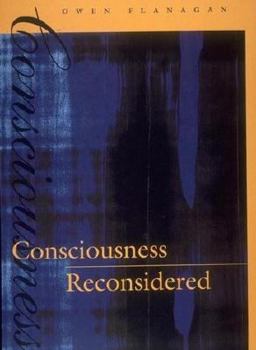Consciousness Reconsidered
Select Format
Select Condition 
Book Overview
Consciousness is neither miraculous nor ultimately mysterious. In this broad, entertaining, and persuasive account Owen Flanagan argues that we are on the way to understanding consciousness and its place in the natural order. No aspect of consciousness escapes Flanagan's probe. Qualia, self-consciousness, autobiographical memory, perceptions, sensations, the stream of consciousness, disorders such as blindsight, various kinds of amnesia, and multiple...
Format:Paperback
Language:English
ISBN:0262560771
ISBN13:9780262560771
Release Date:December 1993
Publisher:Bradford Book
Length:252 Pages
Weight:0.90 lbs.
Dimensions:0.6" x 5.9" x 8.9"
Age Range:18 years and up
Grade Range:Postsecondary and higher
Customer Reviews
4 ratings
Two Historical Clarifications from the Author
Published by Thriftbooks.com User , 17 years ago
I really shouldn't be giving stars to my own book, but it seems to be a requirement here. Two clarifications: 1. It is true that I don't engage Dave Chalmers views in the book. Dave's book appeared about 5 years after mine. 2. The title *Consciousness Reconsidered* has understandably led some to think that it is primarily a response to Dennett's *Consciousness Explained.* It isn't, altho. I do engage some of Dan's arguments. My book was published soon after Dan's & most of my issues w/Dan relate to papers (alto. along w/Ned Block, I discussed Dan's forthcoming book w/him and others on a regular basis. But responding to and/or offering an alternative view to Dennett was not my aim. In fact my view on *consciousness* was sketched out in the long new chapter in *The Science of the Mind* published in 1991.
all great conscious arguments can be found here:
Published by Thriftbooks.com User , 20 years ago
owen flanagan is a masterful scholar that leaves hope for a concept alot of contemporary scientists have given up on and tried to quine. His naturalistic debates are wonderful and illuminating and he criticizes other scientists and philosophic work. All his points are logical and have proof with citations and selections from other works. For the best naturalistic and contemporary philosophic arguments theres no one else to go to other than owen flanagan.
Solid consciousness philosophy
Published by Thriftbooks.com User , 22 years ago
Owen Flanagan's statement of his approach to consciousness makes more sense than those of the Nagels, Jacksons, and Rosenthals of the world. While I tend to find materialist approaches most convincing, I'm often left wanting with respect to those materialists' understandings of real neuroscience.What I liked about Flanagan's view is that he doesn't necessarily try to show off any sort of advanced knowledge of neuroscience because he doesn't have it, and realizes it. Instead, he emphasizes a multidisciplinary, practical approach to understanding consciousness. However, I think he overestimates the importance of psychology -- this is, of course, probably based entirely on my bias as a student of neurobiology and reductionism, which purports someday to reduce psychology to neuroscience. But still, I give him credit for a solid theory that makes intuitive sense.
Philosophy that makes sense.
Published by Thriftbooks.com User , 22 years ago
This is one of the early philosophy books that started to make sense on the issue of consciousness. Comming from a decade where Joe Levine told us there was a gap, Frank Jackson that materialism left something out, McGuinn told us we could not understand it, the Churchlands wanted to get rid of the thing, this book is a great relief. Consciousness, according to Flanagan, is a natural phenomenon, rooted in the brain. IT is real, capable of being defined, it evolved, and tractable scientifically. We need not despair, nor look in wrong and exotic places like quantum mechanics. Psychology, phenomenology, neurobiology and cognitive science will do. This is useful philosophy.In the first chapter, Flanagan sketches the field of philosophy of consicousness. He defines the different positions (consicousness is mysterious, consciousness does not exist, consciousness does not matter, consciousness is unintelligeble, consciousness is miracolous, etc..) and argues for naturalism and the adequacy of science to take on the job. In chapter 2, he shows why elimination of the concept of consicousness will not do. Surely, the concept is ot clear, but it points to a real phenomenon in need of explanation. In chapter 3, Flanagan talks about consciousness and the brain, how and why it evolved, and tries to make clear that there is nothing strange about the idea that cosnciousness might just be the brain itself.IN chapter 4, Flanagan discusses qualia. He concentrates on Dennetss position that qualia should be eliminated scince nothing could have the properties philosophers claim qualia has. Flanagan agrees, but rightly notices that quala need not refer to that which philosophers talk about. Qualia are real, and there is something like to be in a phenomenal state. In chapter 5, Flanagan chalenges the inteligibility gap and the knowledge argument. Consicousness is the brain, but understanding the brain will not cause you to experience somebody elses consciousness. The gap is epistemological not ontological.In chapter 6 Flanagan discusses the new mysterianism, the view that consicousness is a netural explanation, but beyond our cognitive abilities to explain or understand. He points out that most arguments for this position are invalid. The standards set in this view for explanation are unrealistically high, and progress has been done in understanding consciousness, regardless of what mysterians may say. Chapter 7 takes on epiphenomenalism, the view that consicousness serves no function and no casual role. This view in coeherent and should be taken reasonable. Indeed sometimes consiousness seems to be a bystander. But others, it is essential for initiating behaviour, functioning cognitively correctly and develop the self.Chapter 8 is about phenomenology and how the stram of consicousness, although not quite real, is an accurate description of the first person prespective. Chapter 9 is about the illusion of a cartesian I or ego that rules mental life. As chapter 10 makes






